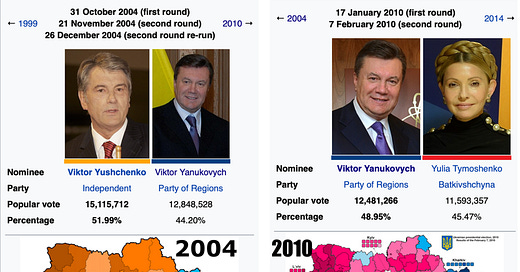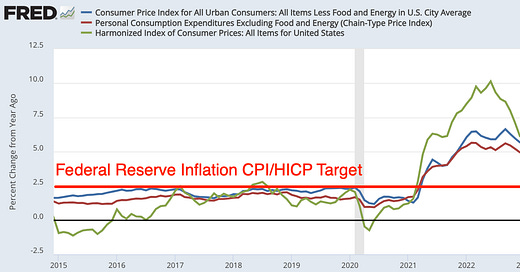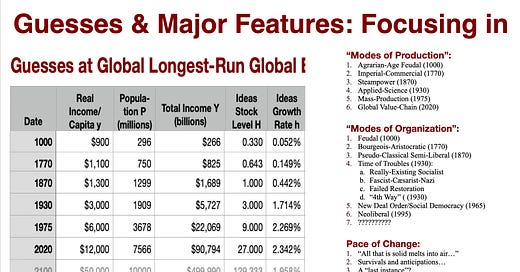
Discover more from Brad DeLong's Grasping Reality
First: Question: How “Cleft” Is Ukraine TODAY?
The standard historical “Dark Continent” European logic of partitioning-&-ethnic-cleansing as the only way to keep large-scale trouble away. But while that might have made sense back in 2004, with the partition running along the historic Borderland-New Russia line, does anybody think it would make any sense today? Does anybody in the region not actively occupied by the military or in the pay of Muscovy ‘Rus really want to be ruled from Moscow’s Kremlin?
Matthew Yglesias: Ukraine & the End of History: ‘For the clearest depiction of Ukraine as a “cleft” country, look at the voting maps of the two elections that featured pro-Russian Viktor Yanukovych as a candidate…. Ukraine was sufficiently “cleft” that Putin could achieve his core goals essentially within the confines of Ukrainian electoral politics. But here’s where things went off the rails for Putin…. People… don’t like being poor…. The path to riches for Ukraine was really clear: try to follow Poland, Romania, Hungary, and Slovakia into a closer trading relationship with Germany….
Ukraine has become steadily less cleft. The pro-Russian faction lost power in 2014 when it became clear that the bar for being pro-Russian was “voluntarily abandon your best chance for economic development” rather than “have a lot of Russian-language shows on TV.” And that’s because the pro-Russian faction was ultimately controlled by Moscow and did not reflect the interests and aspirations of Russophone Ukrainians…. Zelenskyy’s landslide win in 2019…. He did much better in the eastern parts of the country than the west. Zelenskyy is a native Russian speaker, and part of his platform was to be more open to negotiating with Russia to end the conflict in Donbas. This did not work (obviously), but its very failure successfully consolidated Ukrainian identity precisely because Zelenskyy’s policy initially was not seen as coming from a place of hardcore Ukrainian nationalism.
What Zelensky was trying to give people was the basic ingredients of [Fukuyama’s] End of History: good government, autonomy, and prosperity through integration with the richer parts of the world. In his own mind, Putin is surely waging some kind of battle for Russian civilization. But by shelling the cities of eastern Ukraine, he’s just confirmed to everyone that he doesn’t care about them—or really anyone—and that the way forward is to have an independent country on the road to EU membership…. This all essentially reflects the basic logic of the end of history, which is simply that the prospect of economic and political integration with an ever-growing West is very compelling. People in Romania and Bulgaria don’t want to be part of an Orthodox bloc; they want to be rich. People in Russophone Ukraine don’t want Ukrainian economic policy to be made for the convenience of the Russian government…
LINK:
As I see it, if you are nearby to Muscovy ‘Rus, you have four choices as to your status:
Satellite—your government does what Grand Prince of Muscovy ‘Rus wants in everything, and even so they might overthrow throw it and replace it with someone he likes more. Why?Jjust because that is what the Grand Prince of Muscovy ‘Rus does.
Finlandization—in international security policy your government does what Grand Prince of Muscovy ‘Rus wants in everything, and otherwise he leaves you alone.
NATO—you get strong security guarantees from someone Muscovy ‘Rus does not want to tangle with.
Partition—so that part of you becomes a satellite (or worse), and part becomes (2) or (3).
Ukraine thought that it had struck a deal in Budapest in 1994 to be Finlandized <https://en.wikipedia.org/wiki/Budapest_Memorandum_on_Security_Assurances>. Putin thought it was time to demonstrate that that was not so—that Ukraine was a satellite; with perhaps a fallback position of partition along the historic Borderland-New Russia line, with the western half of Ukraine Finlandized.
As I see it, Finlandization went off the table with Putin’s conquest of Crimea. The past two months have shown that Muscovy ‘Rus does not have the power to turn Kyiv ‘Rus into an obedient satellite. So we are now talking about (3) and (4) only. If Muscovy ‘Rus is smart, it will guarantee Ukraine territorial integrity in return for a consultative dual-sovereignty Northern-Ireland role as the protector of and advocate for people in Crimea and Donbass (and perhaps elsewhere) who feel like they are members of Muscovy ‘Rus. If Muscovy ‘Rus is dumb, it will insist on partition, and so further poison its forthcoming relationship with Kyiv ‘Rus.
Condition: MOAR Thoughts on America’s Macroeconomic Outlook:
Key Insights:
Not so much key insights, as key questions: (a) What are the teams? (b) 1920, 1948, 1951, 1974, or 1980? (c) Are there any true members of Team Transitory left? (d) Who is on Team The-Fed-Has-Got-This? (e) Who is on Team Hit-the-Economy-on-the-Head-with-a-Brick? (f) What inflation rate do we want to support economic reopening? (g) What inflation rate do we want to support the sectoral rebalancing—towards goods production, & towards the deliverator economy? (h) How would expected inflation get embedded in the labor market without strong unions and multi-year contracts? (i) How would expected inflation get embedded in the labor market without it first showing up in out-year bond market breakevens?
With Putin’s invasion-of-Ukraine supply shock, Summers’s position looks a lot stronger
But near the zero-lower-bound, there is a high option value to waiting to raise: that optionality seems to dominate right now. It is too early to hit the economy on the head with a brick—even the small 5%-interest-rates brick that Larry wants to see. It won’t be time for that until there is an 80% chance that he is right.
That 80% chance won’t come until we see the 5/5 inflation breakeven move upward, and then see those bond-market expectations start to diffuse to workers and business managers.
But it is not too early for Jay Powell to furrow his brow and say that the Fed is considering Larry Summers’s arguments very carefully.
One Video:
Grzegorz Ekiert, Sigmar Gabriel, Dimitris Keridis, & Mary Elise Sarotte: Europe at War <https:// www.youtube.com/watch?v=zcm849s_CY8>:
One Picture:
Very Briefly Noted:
Adam Tooze & Robert Armstrong: China Under Pressure: ‘Can China make the adjustments necessary to sustain growth, and should global investors go along for the ride? Adam thinks… yes. Ethan and I think… no… L<https://www.ft.com/content/068fabc7-5455-43c4-a512-fcdd3514a1cc>
Faustine Perrin: On the Origins of the Demographic Transition. Rethinking the European Marriage Pattern<http://www.ehes.org/EHES_202.pdf>
Megan McArdle: The key Question Raised by Lia Thomas’s Swimming Success: What Is the Purpose of Women’s Sports?<https://www.washingtonpost.com/opinions/2022/03/23/lia-thomas-trans-swimmer-ncaas-fairness-inclusion/>
David Silver & Jonathan Zhang: Impacts of Basic Income on Health & Economic Well-Being: Evidence from the VA’s Disability Compensation Program: ‘An additional $1,000 per year in transfers decreases food insecurity and homelessness by 4.1% and 1.3% over five years, while the number of collections on VA debts declines by 6.4%… <https://www.nber.org/papers/w29877>
Neal Templin: Investors Are Irrational by Nature. They Can Be Trained to Be More Rational: ‘Dan Ariely…. “Sometimes the best way to get us to act in our long-term best interest is to not let our short-term interest participate”… <https://www.barrons.com/articlesinvestors-irrational-nature-training-51648029602?tesla=y>
Ben Smith & Jensen Huang: Manufacturing Intelligence: ‘Sped up computing by a million-x… enabled revolutionary AI models…. Now AI will revolutionize all industries… <https://stratechery.com/2022/an-interview-with-nvidia-ceo-jensen-huang-about-manufacturing-intelligence/>
Sam Winter-Levy: A Proxy War in Ukraine Is the Worst Possible Outcome—Except For All the Others<https://warontherocks.com/2022/03/a-proxy-war-in-ukraine-is-the-worst-possible-outcome-except-for-all-the-others/>
Andrew Lohsen: Will Russia Create New “People’s Republics” in Ukraine?: ‘So far, Russia has adhered to its 2014 playbook…. If it continues to follow that playbook, Russia might establish new pseudo-states similar to the separatist Donetsk and Luhansk “people’s republics”…. Russia’s problems in finding suitable proxies… <https://warontherocks.com/2022/03/will-russia-create-new-peoples-republics-in-ukraine/>
David Leonhardt: Reducing Covid’s Toll <https://messaging-custom-newsletters.nytimes.com/template/oakv2>
Pauline Grosjean: Conflict, Empires, & Political Preferences: ‘More than 35,000 individuals in 35 countries to show how conflict victimisation in WWII left a negative imprint on levels of political trust throughout Europe and Central Asia that has persisted… <https://voxeu.org/article/conflict-empires-and-political-preferences>
Tommaso Porzio & Federico Rossi: Measuring the Role of Human Capital for Structural Transformation: ‘From farms to offices…. 52 countries… an increase in schooling led to a sharp reduction in the agricultural labour supply… <https://voxeu.org/article/measuring-role-human-capital-structural-transformation>
Sean Illing: How Vladimir Putin Became the Victim of His Own Lies: ‘Vladimir Putin and the dangers of yes-men… <https://www.vox.com/policy-and-politics/2022/3/24/22982864/vladimir-putin-russia-ukraine-war-brian-klaas>
Andrés Velasco: Democracy Is the Next Identity Politics <https://www.project-syndicate.org/commentary/putin-war-in-ukraine-liberal-democratic-reaction-by-andres-velasco-2022-03>
Twitter & ‘Stack:
Ezra Klein: ’No one wants Larry Summers to be right about where the economy is going… not even Larry Summers. But so far, he’s been a lot closer to the mark than his critics. So what if what he’s saying now is true, too?…
Jomini of the West: ’Russian forces will continue to tie down Ukrainian forces before Kyiv, in NE Ukraine, and before Kharkiv, however the focus of major offensive action will be in the Donetsk, Luhansk, Kherson, and Zaporizhzhia… <

Noah Smith: Give Us All the Refugees, Dammit!: ’America used to open our arms to people fleeing war and tyranny. We need to get back to that… <
Addison Del Mastro: The Car & Car Dependence: ‘We were sold—and to our discredit, we bought—gridlock and rush hour and ten-minute trips for a half-gallon of milk…
Timothy Snyder: The Kremlin’s Formula for Failure: ‘Putin’s notion was that Russia would be negotiating with a puppet Ukrainian government on the third day of the invasion…
Matthew Yglesias: I’m an Optimist About Higher Education: ‘A rough few years for colleges’ business model is going to make things better than ever… <
Robert Reich: Why do Putin, Trump, Tucker Carlson, & the GOP sound so much alike?
David Rothkopf: ’The Russian invasion of Ukraine has revealed a geopolitical landscape quite different from that officials and many experts thought was in place…. We should be more careful in our language. Allies are different from partners, partners are different from friends, friends are different from fair-weather friends, the non-aligned are different from rivals and rivals are different from enemies…


Director’s Cut PAID SUBSCRIBER ONLY Content Below:
Paragraphs:
Wonderful paper. Brilliant paper. Important lessons on how a bureaucracy focused on keeping people from cheating and mooching causes enormous harm. Plus, of course, the inescapable truth that anything, anything at all is very much worth doing that takes even a small step toward fixing the fact that poor people have much less social power than any sensible societal well-being function would allocate to them:
David Silver & Jonathan Zhang: Impacts of Basic Income on Health & Economic Well-Being: Evidence from the VA’s Disability Compensation Program: ‘Quasi-random assignment of veterans claiming mental disorder disability to examiners who vary in their assessing tendencies. We find that an additional $1,000 per year in transfers decreases food insecurity and homelessness by 4.1% and 1.3% over five years, while the number of collections on VA debts declines by 6.4%. Despite facing virtually no direct monetary costs, healthcare utilization increases by 2.5% over the first five years, with greater engagement in preventive care and improved medication adherence… in part explained by the ability to overcome indirect costs of accessing care (“ordeals”)… transfers improve communication and trust between veterans and VA clinicians…
I feel a huge gap in my knowledge that is keeping me from understanding the world I am going to live in. I really do not think I have a proper gasp of what a "graphics processing unit" or a “neural engine" really is and does:
Ben Smith & Jensen Huang: Manufacturing Intelligence: ‘The theme of Huang’s keynote was the idea of AI creating AI via machine learning; he called the idea “intelligence manufacturing”: "Accelerated computing, at data center scale, and combined with machine learning, has sped up computing by a million-x… enabled revolutionary AI models… made self-supervised learning possible… fundamentally changed what software can make, and how you make software…. Over the past decade, Nvidia-accelerated computing delivered a million-x speed-up in AI, and started the modern AI revolution. Now AI will revolutionize all industries. The CUDA libraries, the Nvidia SDKs, are at the heart of accelerated computing…. The core idea behind machine learning is that computers, presented with massive amounts of data, can extract insights and ideas from that data that no human ever could; to put it another way, the development of not just insights but, going forward, software itself, is an emergent process. Nvidia’s role is making massively parallel computing platforms that do the calculations necessary for this emergent process far more quickly than was ever possible with general purpose computing platforms…
The A.C. Pigou in me says: heavy, heavy taxes on commuting auto mileage, funneled into mass transit as the obvious solution:
Addison Del Mastro: The Car & Car Dependence: ‘I take transit when it fits my schedule and when it drops me where I need to be, but I do rather enjoy a long drive, and transit often fails to meet those criteria anyway…. Cars are great for leisure and exploration and sport, but not so great for commuting, running errands, and other everyday tasks, at least in areas that were already substantially built out before widespread car ownership. It was once common, for example, to own a car for weekend drives, but commute on the trolley. But we were sold—and to our discredit, we bought—gridlock and rush hour and ten-minute trips for a half-gallon of milk and 30,000 Americans violently killed each year under the banner of exploration, freedom, and the open road…
LINK:
I concur that the future of higher education is very bright, if we figure out how to do our jobs better. Where we are needed is as motivators and knowledge coaches: finding for each individual student the set of reading, writing, listening, watching, questioning, answering, and debating that works best for them, and providing a motivational structure—which requires not just grading-and-assessment, but also East African Plains Ape doing-things-in-teams—to get people over the actually-do-the-work hump.
We have formal systems that accomplish a bunch of this, for many people at least. But that is not what we are focused on. And so we do a job that is both incredibly effective and yet half assed compared to what we might be able to do:
Matthew Yglesias: I’m an Optimist About Higher Education: ‘A rough few years for colleges’ business model is going to make things better than ever…. The thing about college is a lot of people like it! Not just because college is fun and has parties and stuff, but because a lot of people learn a lot of interesting things at college. I think I’m pretty decent at learning things on my own. But I took plenty of classes in college that involved close readings of dense texts or detailed technical matters, and I’m very bad at studying that kind of thing independently. Without the formal structure of a technical logic class, I’d never have been able to get through the proof of the diagonal lemma or all the technical aspects of Tarski’s undefinability theorem or Gödel’s incompleteness theorem. Some people absolutely could do that. But I couldn’t. The discipline of formal learning helped a lot with that. And with reading “Anna Karenina.” And with understanding David Lewis’ arguments about causation and possibility…. The nice thing about a world in which colleges need to compete harder for the patronage of a dwindling population of 18-year-olds is that the schools themselves need to try to raise their game…
LINK:
Chad Orzel: Imminent Death of the Academy Predicted: ‘The usual “You can learn what you need to be a successful tech person without all the expensive ancillary nonsense that comes with modern higher education”… is true in a narrowly literal sense…. [But] the number of people who think they’re the right sort of highly motivated autodidact to bypass academia is at least one and probably more like two orders of magnitude larger than the number of people who really are…. You absolutely do not need the assistance of a tenured faculty member…. The motivation to work out all the end-of-chapter problems in the textbook without peeking at the solutions online is a lot harder to come by…
LINK:
With respect to David Leonhardt: Yes, but having people wear indoor masks in the presence of the immunocompromised, or those who might come in contact with the immunocompromised, is a no-brainer as well. That the Republican Party has decided that its people’s CORE FREEDOM is the right not to have to take even a small step to avoid being Typhoid Mary for COVID shows its moral bankruptcy. David Leonhardt should not be pretending that that is an OK thing:
David Leonhardt: Reducing Covid’s Toll: ‘1. More boosters…. 2. The immunocompromised… Evusheld…. 3. Post-infection treatments… Paxlovid…. 4. Masks…. A high-quality mask will protect the wearer even if others nearby are maskless. The bottom line: All four of these steps have small costs and large benefits…























Leonhard
1. More boosters: The CDC has really been remiss in not actively recommending boosters. It has been “maybe” “for some people”
2. Post-infection treatments: We are still suffering from a scarcity of cheap, screening tests that would permit early post-infection treatment.